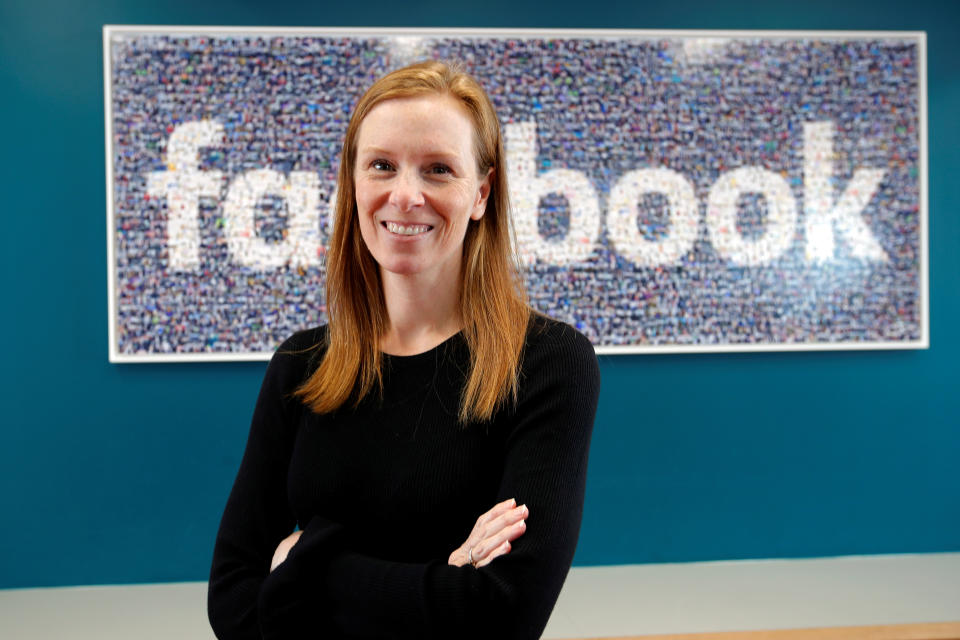Exclusive: Facebook exec: 'We do not' have an anti-conservative bias
America’s biggest tech companies including Facebook (FB) have faced accusations of anti-conservative bias from politicians and others, but a top executive at the social network flatly refutes that claim.
When asked whether the company has an anti-conservative bias, Facebook Head of Global Policy Management Monika Bickert explicitly told Yahoo Finance in a recent interview, “We do not.”
The Facebook executive spoke about the topic of alleged anti-conservative bias as part of a wide-ranging interview that Yahoo Finance Editor-in-Chief Andy Serwer conducted with her and two other executives who oversee content at Facebook: John DeVine, VP of Global Operations; and Guy Rosen, VP of Integrity.
The topic of supposed anti-conservative bias by tech giants has been a favorite one of President Donald Trump, who in July accused Facebook, Google (GOOG, GOOGL), and Twitter (TWTR) of “terrible bias” against him and his supporters. Previously, in April, Republican senators claimed in a hearing that the same tech giants muzzle conservative voices.
How do we know there’s no bias?
When asked how users can be sure there’s no anti-conservative bias, Bickert pointed to the fact that back in April 2018 Facebook published the internal guidelines it uses to decide whether to remove posts.
“When John's [DeVine’s] team members are looking at a piece of content and making a decision, we want people to understand that they're not applying their own subjective beliefs about what they think should be on the site,” Bickert said. “They have very granular rules that they have to apply. And those rules are now public for people to see.”
Still, more recently, in August, Facebook released the findings of a report it commissioned on anti-conservative bias showing that “there is still significant work to be done” to satisfy concerns from conservatives who believe the social network discriminates against them.

The investigation was conducted by former Republican Senator Jon Kyl and his legal team at Covington & Burling LLP.
Three main concerns were highlighted in the report: algorithm changes, clickbait and spam, and fact-checking and false news. Although Facebook uses fact-checkers to verify the validity of news, the report states that the organizations utilized for it often skew to the ideological left, leading conservatives to express “significant concerns” about what is actually considered false news.
‘We don’t want them to be surprised...’

Facebook had received particular criticism from pro-life groups, who claimed their ads were being censored on the site. Bickert explained that this was due to images depicting babies with medical tubes in their bodies.
“This policy we’ve had on ads for a long time,” she said. “We don’t allow people to share images in an ad that shows somebody with medical tubes in their body. And that’s because if somebody’s seen an ad on Facebook, we don’t want them to be surprised or unnecessarily upset.”
However, after receiving feedback from the Kyl report and speaking with pro-life groups, Facebook decided to amend part of that policy, focusing more on intent.
“What we’re hearing from pro-life groups was that this was a really important part of them getting out their political message, so we’ve refined that policy, in part because of some of that input,” Bickert said. “We’re looking to see how was the ad more broadly intended. And are there signs of distress? If not, if this is something where they’re saying, ‘this baby survived and is living and it’s a wonderful thing, we should celebrate,’ and there happens to be a medical tube in that body, then that’s something we allow.”
While Facebook executives made it clear that they were receptive to the concerns voiced in the report it commissioned, not everyone else was as satisfied. Politico reported that Brent Bozell, president of the conservative Media Research Center, felt that the report indicated conservative complaints “fell on deaf ears” and that it “stunningly fails to admit fault or wrongdoing.”

Adriana is an associate editor for Yahoo Finance. Follow her on Twitter @adrianambells.
READ MORE:
Facebook's Zuckerberg and Sandberg are this involved with the company's content issues
Read the latest financial and business news from Yahoo Finance
Follow Yahoo Finance on Twitter, Facebook, Instagram, Flipboard, SmartNews, LinkedIn, YouTube, and reddit.



